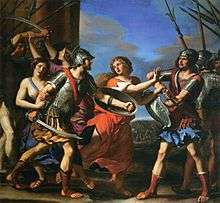Hersilia
For the spider genus, see Hersilia (genus).

Hersilia from a detail of The Intervention of the Sabine Women, Jacques-Louis David (1799)
In Roman mythology, Hersilia was a figure in the foundation myth of Rome. She is credited with ending the war between Rome and the Sabines.
Battle of the Lacus Curtius
In some accounts she is the wife of Romulus, the founder and first King of Rome in Rome's founding myths. She is described as such in both Livy and Plutarch; but in Dionysius, Macrobius, and another tradition recorded by Plutarch, she was instead the wife of Hostus Hostilius, a Roman champion at the time of Romulus. This would make her the grandmother of Tullus Hostilius, the third king of Rome.
Livy tells this tale in his writing. I.xi:
| “ | While the Romans were thus occupied in the City, the army of the Antemnates seized the opportunity afforded by their absence, and made an inroad upon their territory; but so swiftly was the Roman levy led against them that they, too, were taken off their guard while scattered about in the fields. They were therefore routed at the first charge and shout, and their town was taken. As Romulus was exulting in his double victory, his wife Hersilia, beset with entreaties by the captive women, begged him to forgive their parents and receive them into the state; which would, in that case, gain in strength by harmony. He readily granted her request.[1] | ” |
Just like her husband (who became the god Quirinus), she was deified after her death as Hora, as recounted in Ovid, Metamorphoses 14.829–851:

Hersilia Separating Romulus and Tatius (1645) by Guercino
| “ | His queen, Hersilia, wept continually, regarding him as lost, till regal Juno commanded Iris to glide down along her curving bow and bring to her these words: “O matron, glory of the Latin race and of the Sabines, worthy to have been the consort chosen by so great a man and now to be his partner as the god Quirinus, weep no more. If you desire to see your husband, let me guide you up to a grove that crowns the hill of Quirinus, shading a temple of the Roman king.” Iris obeyed her will, and, gliding down to earth along her tinted bow, conveyed the message to Hersilia; who replied, with modest look and hardly lifted eye, “Goddess (although it is not in my power to say your name, I am quite certain you must be a goddess), lead me, O lead me until you show to me the hallowed form of my beloved husband. If the Fates will but permit me once again to see his features, I will say I have won heaven.” At once Hersilia and the virgin child of Thaumas, went together up the hill of Romulus. Descending through thin air there came a star, and then Hersilia her tresses glowing fiery in the light, rose with that star, as it returned through air. And her the founder of the Roman state received with dear, familiar hands. He changed her old time form and with the form her name. He called her Hora and let her become a goddess, now the mate of Quirinus. |
” |
See also
References
- ↑ Translated by B.O. Foster, Harvard University Press (1919).
External links
- Roman Myth Index
- Bryn Mawr
- T. P. Wiseman: The Wife and Children of Romulus (The Classical Quarterly, Vol. 33, No. 2, pp 445-452, 1983)
This article is issued from Wikipedia - version of the 11/29/2016. The text is available under the Creative Commons Attribution/Share Alike but additional terms may apply for the media files.